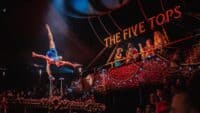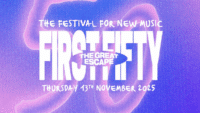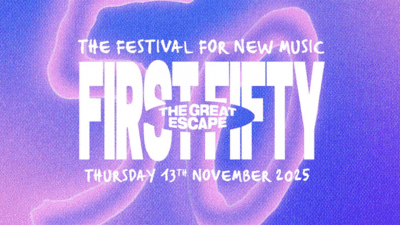New Music
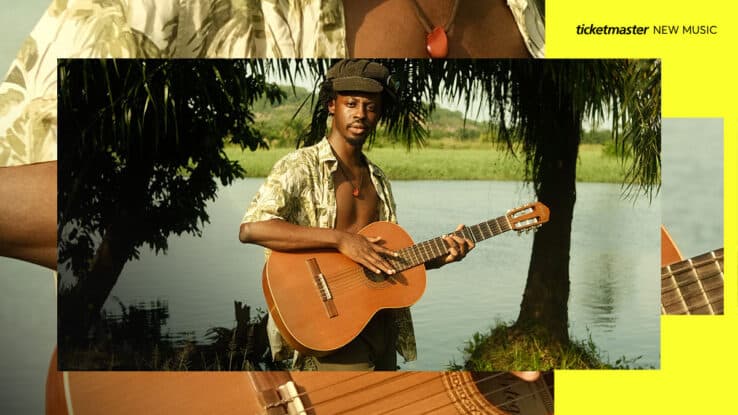
Interview
Tommy WÁ: “Connecting to an audience keeps me alive”
One of the year's most promising breakthroughs on how important a sense of community is to his impassioned style of folk music
In the modern music landscape, new names can crop up and stick with such speed that it feels like they appeared out of nowhere. Tommy WÁ is one such artist who has had a major breakthrough in 2025, performing in a brewery at The Great Escape festival in May before a rapid turnaround for full band showing at Latitude, a support slot with Macy Gray, and the release of an EP that pricked the ears of the UK music press.
But the Nigerian-born artist did not appear from nowhere. After moving to Accra, Ghana, at the age of 18, Tommy fell in love with performing live, and not just on a stage: “a living room, a friend’s house, by the streets, in the ghetto, whatever it is… I’m just holding my guitar and playing shows and kids would gather,” he reflects. He became a “one man machine” as he learnt to be his own promoter, manager and agent across almost a decade, and even became the curator for Sofar Sounds’ Accra contingent. Building community became integral to the artist’s own solo ethic and ultimately his blooming success today: it was his Living Room Tour in 2020/21, in which he played in over 40 living rooms across West Africa, that established a real following to build on. “The kind of music that I was going to want to make wasn’t going to be the mainstream,” he says, “so I wasn’t going to be able to use mainstream styles or formats to form community. I had to be very deliberate on how I could attain the sense of community and audience and build from there.”
A sense of place is, then, intertwined with Tommy WÁ’s music, be it symbolism (‘Somewhere Only We Go’ is the title track and through line of his latest release), a readiness to perform wherever possible, or the blend of Afro and Western styles of contemporary folk.
As one of the coveted First Fifty artists announced for 2026’s The Great Escape festival, and with new headline dates in Glasgow, Manchester, Bristol and London recently announced, we got to know more about this endearing artist’s journey.
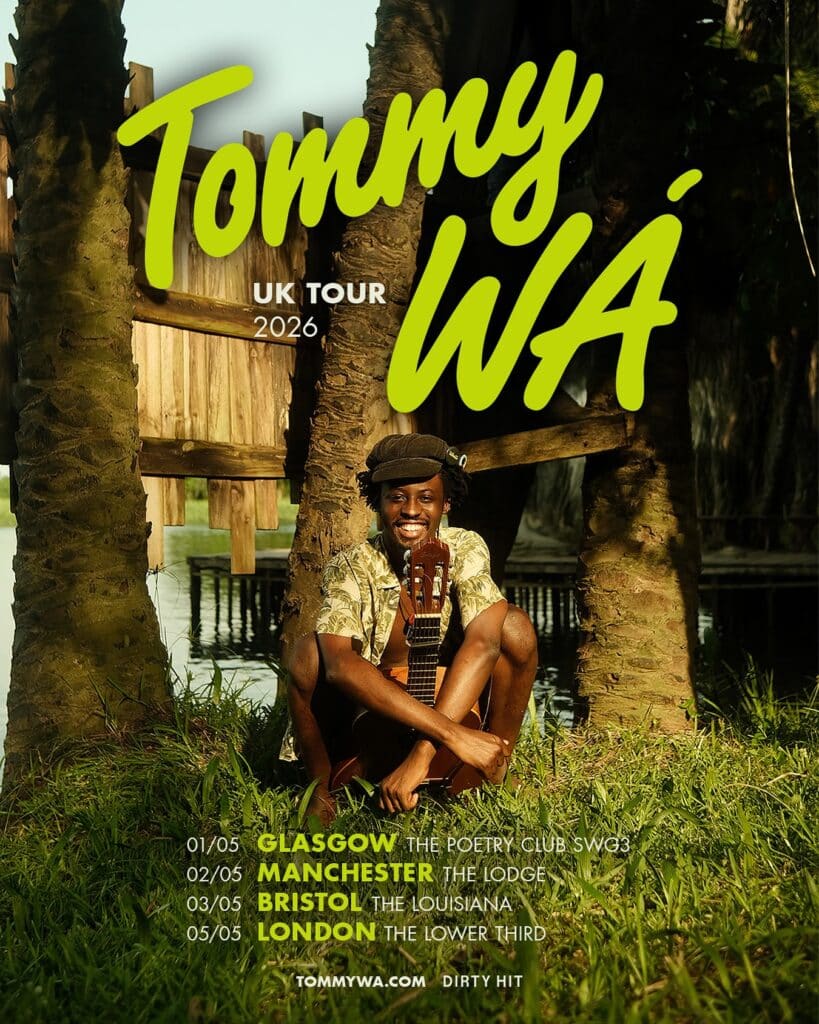
Your latest release, Somewhere Only We Go, shares its name with a small festival in Accra you help to put on, and you also to curated Sofar Sounds there too – it seems that community events are always intertwined with your own music…
Yeah, absolutely. For Road Man and Folks I did the living room tour, and for Somewhere Only We Go we do shows every New Year’s Eve. We might be doing one soon. But you know, stuff like that helps to introduce people to the project from a live perspective. That’s how I’ve always done it. There has to be a live perspective to whatever I’m releasing, and that has sort of kept me in check to how I can always connect to the audience through the years and not lose focus. No matter how big the stage gets, I would still do these things because that is what keeps me alive, yeah.
You can tell your music has a lot of heart, and with that in mind, has it been hard to show that to its fullest extent at some of the more ‘industry’ showcases you’ve done in this side of the world over the past year?
I hear that it could be, it’s bit easier for me to just be like, yeah, it’s challenging, but that’s lazy. I’m not operating from my early 20s anymore, so I’ve grown to understand that these things are necessary, but the attitude in which I do it now is everyone is an audience, even industry people. Last year at the first Great Escape festival that I played, I didn’t even know who was who. I probably saw you, but I didn’t know who you were, I just saw you as a person who was there to listen, and as much as you were there to do your job, the music could also be something for you, if you allowed yourself to listen, you know? So that’s how I have come to engage with that side of the industry.
Besides, I also have a sense of a long game. This is not a short term thing, so I’m not now going to come and start getting frustrated by like, oh they didn’t clap for you, or they were still faced. I’m like, OK cool. The audience was difficult. Moving on. It’s life, you know? How I see it is quite different, maybe because of age and experience now to the point where I’m like, year I’m trying to play the long game. So if it doesn’t happen now, it’s gonna happen. It needs to happen. It will happen.
Take me back to your first taste of Europe when you came over to Berlin?
My first time was in 2022 in a residency programme. It was great to see Berlin, or Europe, as a form of expression and see that different forms of expression were allowed to thrive there, without even struggle, you know? I mean, there’s still the natural struggle of every artist. But in Ghana, or in Africa, I have to explain maybe 10 times during my set that this is whatever my music means. This is this. This is that. But I think it was a different storytelling in Europe this time around. Even working with fellow residents who were charged with the tools of knowing how to record simply guitars and this and that, and access to great venues where you don’t have to try so hard to get an okay sound, you know? These were some of the challenges that were overcome just by me being in in Europe. It was really great. I like that I was introduced to Berlin first.
We’ve talked about how important community is to your own playing, so do you ever feel lonely when you come over her to play solo?
It does get lonely. I can’t even try to hide it. In Accra, I play with a band but whenever I come to Europe, I’m solo. I joked that after my first headline show in London last year, which sold out, it was great talking to everybody after, but then I had to get on a train by myself at like 11.30 at night, quiet on the Victoria line, looking at my camera and thinking this is what life is gonna be. So it does get lonely. I mean, like every artist in my situation would most likely hope for, I am privileged to have a family; I communicate with my dad, who’s constantly trying to be involved in my music career, and my mum. My brother, and sister live in the UK, my partner stays in the UK, I have a list of friends that I call every now and then. So those are the things that just ground me in many ways through the lonely times, because it does get lonely and cold.
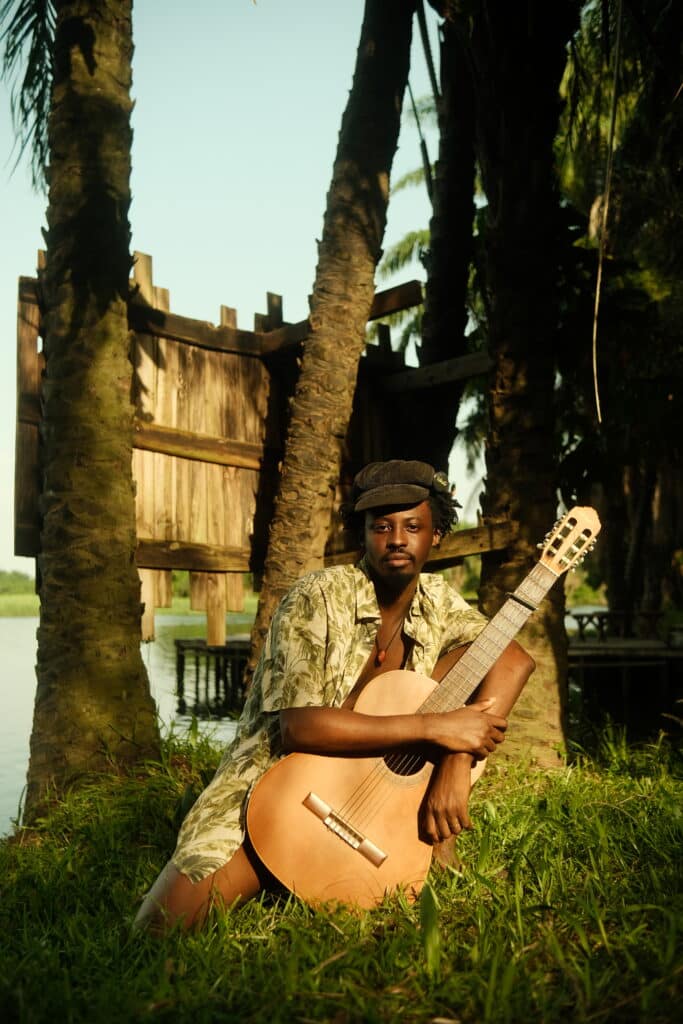
You’ve talked before about a kind of musical stubbornness in West Africa for slower, more insular musical styles such as your own. Can you expand on that a little, and do you hope to be an example of how that attitude can shift?
I’ve come to understand it even more recently, but it’s quite economical. It’s quite political, social engineering of a sort. And it’s not just from the outside, from the inside, you know? It’s not just about the people, it’s that even if people want to afford quality shows like mine, they can’t, because they don’t make as much, so they’re not going to come to the shows. So the only people that have access to the shows are diplomats or expats in that country, and they can afford the show. The biggest artist in Ghana had a show of 200,000 people, but it was a free show. As to the general perception of this kind of expression that I do, it’s not new in Nigeria, it’s not new. It’s not like something that is foreign to us. It’s it’s been there, but it’s just that we don’t get as much push, we don’t get as much encouragement because it’s not monetisable first of all, and the only things that can be monetised are things that our people would be happy to put their money behind – things that are quite mainstream to us, that gets people dancing, a lot of people dancing.
But to set an example for kids, or whatever? I don’t hope to do this by myself. At the moment, I’m concentrating on myself to be able to learn and create a system in which other people like me can come through. I pray that it continues like that, that this work that I do and this career that I do is in total service to my people and service to my Creator that can bring more people into this understanding. Absolutely that’s the whole purpose. It is for service to my people, and if a 15 year old kid can pick up the guitar and be like, okay, cool, that’s a benchmark. I’m trying to top that, so that nvestors can see me and be like, oh, yeah, Tommy tripled this, or made something from that. Hence we can trust that we can go in for another African kid or another this, another that, that’s what the purpose is at the moment. I’m not trying to do it alone. I hope there are other people who are pulling their weight. And if there’s five of us, great. If there’s 10 of us, even better.
‘Celestial Emotions’ has the least amount of streams from your new EP, but it’s one that stands out the most to me. What can you tell me about the track?
That’s wonderful that you noticed. My manager and I were talking about it the other day, and we were like, “‘Celestial Emotions’ is such a jam, you know?” It’s quite vulnerable. It’s been very hard talking about that, because these things are my real life, and I never noticed process the thoughts around ‘Celestial Emotions’ until the release. So I’ve had to take the last two months to actually think about what it’s about. What I’ve come to understand is it’s the experience of love at its purest form, no sort of contamination in a sense, and the blessings it comes with. It’s something I got to experience five years ago, or more than now, with this person I was seeing. It was like the purest form of love, there were blessings, there was forgiveness, there was mercy, there was grace on part of my life around that period, and the sun and the moon and stars were all in harmony, you know?
I’m sounding very philosophical, but that was what it felt like, imagine the sun and the moon could stay for days in an eclipse. That’s the beauty that I tried to express in that song, and also introduce African percussive aspects, you know, like everyone is dancing, the sun, the moon, the stars, everyone is dancing. I felt it. This person felt it. Everyone felt it. This is the first time I’m actually saying all of this, but at least I can articulate it to you, which I’m grateful for, because I never know what to say about the song, because it’s now that I’m starting to process what the meaning of the song is, because I for every song I write, I live out the experience.
What do you look forward to for 2026?
It’s going to be a very interesting year, I hope. Wonderful things are coming. I believe there might be another project. There will be a headline tour, festivals, and I’m just looking forward to getting in front of people: five people, 10 people, 10,000, whatever number of people like my service. It looks like I’m going to get in front of a lot of people and be able to share my story and share my message. And I’m very excited for that.
Tommy WÁ plays Glasgow, Manchester, Bristol & London 1 – 5 May 2026. Find tickets here





